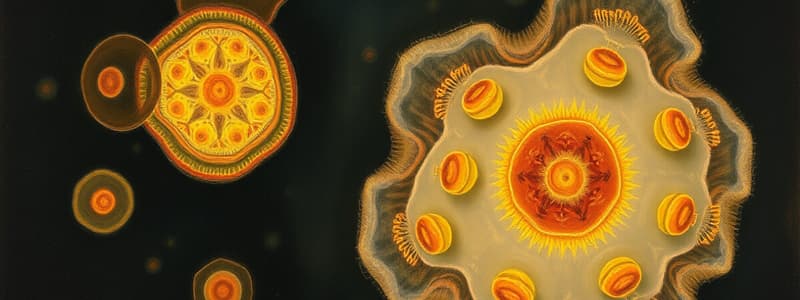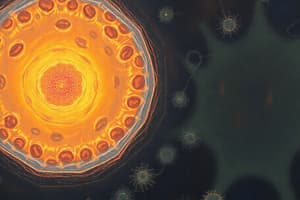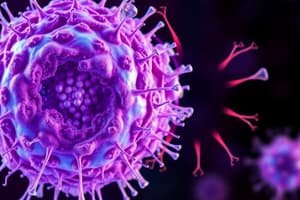Podcast
Questions and Answers
What structure in bacteria is primarily responsible for DNA replication?
What structure in bacteria is primarily responsible for DNA replication?
- Plasmid
- Flagella
- Ribosome
- Nucleoid (correct)
What is the primary function of pili in bacteria?
What is the primary function of pili in bacteria?
- Locomotion
- Protein synthesis
- DNA replication
- Attachment to surfaces (correct)
What kind of motion do flagella use to propel bacteria?
What kind of motion do flagella use to propel bacteria?
- Corkscrew motion
- Propeller-like motion (correct)
- Pulsating motion
- Wave-like motion
What is the primary component of the fungal cell wall?
What is the primary component of the fungal cell wall?
In what structure do ribosomes synthesize proteins?
In what structure do ribosomes synthesize proteins?
Which of the following is NOT a component of bacterial cells?
Which of the following is NOT a component of bacterial cells?
What is the role of pores in the nuclear membrane?
What is the role of pores in the nuclear membrane?
What is unique about the membrane composition of fungal cells compared to mammalian cells?
What is unique about the membrane composition of fungal cells compared to mammalian cells?
What is the primary function of the plasma membrane in prokaryotes?
What is the primary function of the plasma membrane in prokaryotes?
How do eukaryotes differ from prokaryotes in terms of cellular structure?
How do eukaryotes differ from prokaryotes in terms of cellular structure?
What role does the capsule serve in certain bacteria?
What role does the capsule serve in certain bacteria?
What is the primary composition of capsules found in some bacteria?
What is the primary composition of capsules found in some bacteria?
What is a characteristic feature of the bacterial cell wall?
What is a characteristic feature of the bacterial cell wall?
What is the primary function of thylakoids in microalgae?
What is the primary function of thylakoids in microalgae?
Which statement is true about plasmids in bacteria?
Which statement is true about plasmids in bacteria?
Which components make up the cell walls of microalgae?
Which components make up the cell walls of microalgae?
Which of the following best describes binary fission?
Which of the following best describes binary fission?
What does the cytoplasm in bacterial cells primarily consist of?
What does the cytoplasm in bacterial cells primarily consist of?
What role does starch play in the life cycle of microalgae?
What role does starch play in the life cycle of microalgae?
What is one function of the vacuole in oxygenic phototrophs?
What is one function of the vacuole in oxygenic phototrophs?
What is synthesized in the chloroplasts of photoautotrophic microalgae?
What is synthesized in the chloroplasts of photoautotrophic microalgae?
What is the primary role of ribosomes in a cell?
What is the primary role of ribosomes in a cell?
Which organelle is primarily responsible for generating cellular energy in the form of ATP?
Which organelle is primarily responsible for generating cellular energy in the form of ATP?
What distinguishes rough endoplasmic reticulum (rER) from smooth endoplasmic reticulum (sER)?
What distinguishes rough endoplasmic reticulum (rER) from smooth endoplasmic reticulum (sER)?
What is the function of the fungal vacuole?
What is the function of the fungal vacuole?
Which of the following components is NOT part of the fungal cytoskeleton?
Which of the following components is NOT part of the fungal cytoskeleton?
What role does the lysosome play in a cell?
What role does the lysosome play in a cell?
Where are ribosomes primarily assembled within the cell?
Where are ribosomes primarily assembled within the cell?
What is a major characteristic of fungal membranes?
What is a major characteristic of fungal membranes?
Flashcards are hidden until you start studying
Study Notes
Prokaryotes vs Eukaryotes
- Prokaryotes have a nucleoid, which is not a membrane-bound nucleus, and lack membrane-bound organelles.
- Eukaryotes contain a defined nucleus and various membrane-bound organelles and can be unicellular or multicellular.
- Prokaryotic multiplication occurs via binary fission; eukaryotic methods vary.
Bacterial Structure
- Bacteria may possess a protective capsule made of polysaccharides that prevents desiccation and protects against phagocytosis; this capsule enhances virulence in pathogens like Escherichia coli and Streptococcus pneumoniae.
- Bacterial cell envelope has two to three layers: the cytoplasmic membrane, cell wall, and optionally an outer capsule.
- The cell wall provides rigidity and determines bacterial shape (rod, coccus, spiral) and is mainly composed of peptidoglycan.
Cytoplasm and Genetic Material
- Bacterial cytoplasm contains water, enzymes, nutrients, wastes, gases, ribosomes, chromosomes, and plasmids, crucial for growth and metabolism.
- Plasmids, circular DNA strands, confer selective advantages and replicate independently of chromosomal DNA, although they are not essential for survival.
- The nucleoid is an area within the cytoplasm housing the chromosomal DNA, typically a single, circular chromosome.
Specialized Structures
- Pili are hair-like projections aiding in adhesion to surfaces; their absence can hinder pathogenic bacteria from infecting hosts.
- Flagella provide locomotion via a propeller-like motion, allowing bacteria to navigate toward nutrients or away from toxins.
Ribosomes and Protein Synthesis
- Ribosomes, composed of RNA and proteins, serve as the site for protein synthesis, translating mRNA into amino acid chains that form proteins.
- Ribosomes are formed in the nucleolus and distributed throughout the cytoplasm.
Fungal Cell Characteristics
- Fungal cell walls consist of 80-90% carbohydrates, predominantly chitin, with proteins and lipids also present.
- Fungi have membranes containing ergosterol instead of cholesterol, sharing structural similarities with other biological membranes.
Cellular Organelles in Eukaryotes
- The Golgi apparatus is involved in modifying, sorting, and packaging proteins; it consists of cisternae arranged in dictyosomes.
- Rough endoplasmic reticulum (rER) synthesizes proteins, while smooth endoplasmic reticulum (sER) focuses on lipid synthesis and calcium homeostasis.
- Lysosomes act as the cell's digestive system, breaking down external materials and obsolete cell components.
Cytoskeleton and Mitochondria
- The fungal cytoskeleton, made of F-actin, microtubules, and septins, is essential for cell morphogenesis.
- Mitochondria are vital for ATP production, conducting energy generation via the TCA cycle and oxidative phosphorylation.
Vacuoles and Chloroplasts
- Fungal vacuoles serve as storage and degradation compartments for various small molecules and ions.
- In microalgae, chloroplasts are critical for photosynthesis and synthesis of chlorophylls, carotenoids, and starch.
Thylakoids and Energy Storage
- Thylakoids in chloroplasts assist in photosynthesis by synthesizing ATP and reducing NADP+ for energy production during the Calvin cycle.
- Starch accumulates in plastids of green algae and land plants as a primary chemical energy source, with enzymes facilitating metabolic pathways.
Intracellular Communication and Function
- Septa can have pores for transporting organelles like ribosomes and mitochondria between cells.
- Microalgae function in various environments, representing a group of unicellular photosynthetic organisms living in aquatic or terrestrial contexts.
Cellular Regulation and Homeostasis
- The vacuole plays a multifunctional role in maintaining homeostasis, storing substances, and facilitating catabolism in organisms.
- Cytoplasmic components regulate various cellular processes, contributing to overall functioning and survival.
Studying That Suits You
Use AI to generate personalized quizzes and flashcards to suit your learning preferences.




